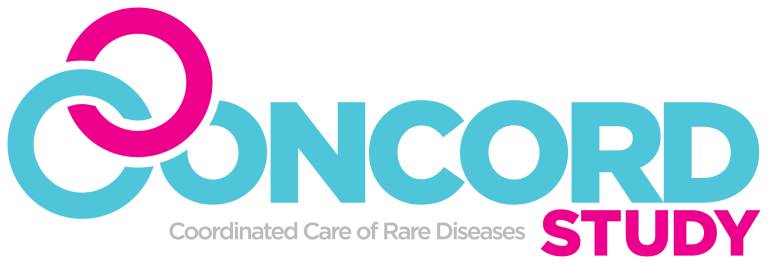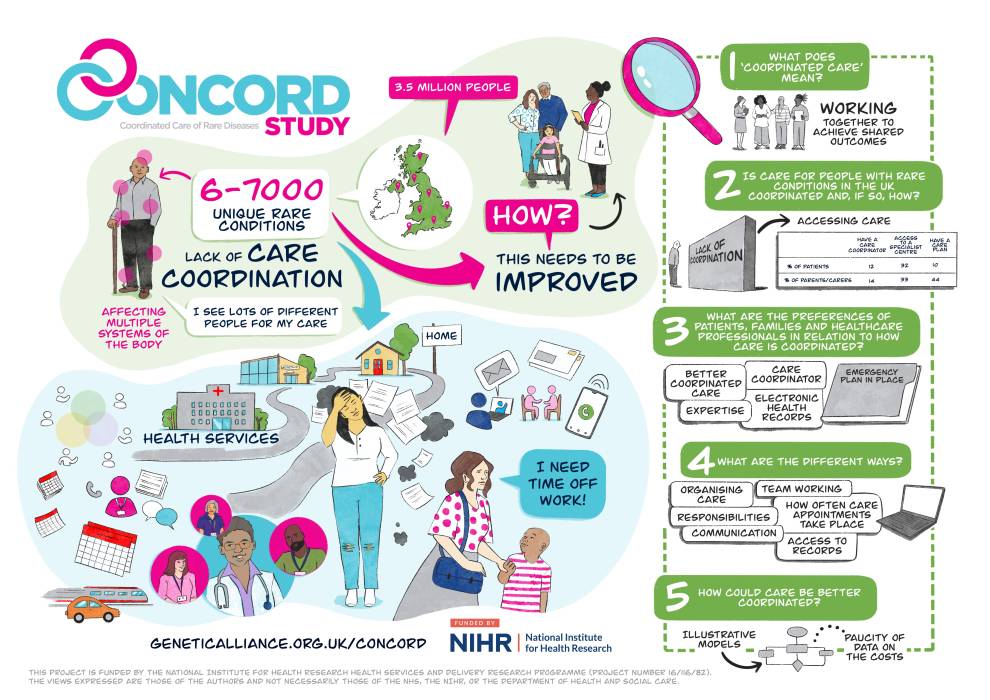
The CONCORD (CoOrdinated Care Of Rare Diseases) study looked at how care services for people with rare diseases are coordinated in the UK, and how people affected by rare diseases and health care professionals who treat rare diseases would like them to be coordinated. It is a collaboration between patients and carers affected by rare conditions, health care professionals with expertise in rare conditions, and health services researchers.
What problem is CONCORD trying to address? Poor coordination of care is a problem faced by many people affected by rare diseases, and is an important and common concern among patients and families. Poorly coordinated care means:
Some people have access to specialist centres, some do not.
Many patients do not have a care coordinator or advisor.
Patient information may not be shared effectively between services meaning there may be gaps in care.
Patients and families frequently have to attend multiple clinics and travel significant distances to them.
What are we doing?
Identifying key features of “coordinated care” for people with rare diseases, and examining whether these are similar to coordinated care for people with other conditions.
Finding out how care for people with rare diseases is coordinated in the UK.
Analysing what aspects of coordinated care matter most to patients, families, and health care professionals.
Developing and refining ways of classifying models of care coordination.
Calculating the costs of these models of coordinated care.
Working closely with patients and families throughout the project and disseminating findings widely.
To learn more about the study, please see our Study Protocol or visit Genetic Alliance website.
Publications
Full study report:
Morris S, et al. Coordinated care for people affected by rare diseases: the CONCORD mixed-methods study. Health Soc Care Deliv Res 2022; 10(05)
Headline findings:

Research findings:
Walton H, et al. Developing a taxonomy of care coordination for people living with rare conditions: a qualitative study. Orphanet Journal of Rare Diseases 2022; 17(171)
Walton H, et al. Development of models of care coordination for rare conditions: A qualitative study. Orphanet Journal of Rare Diseases 2022; 17(49) [WATCH SHORT ANIMATION]
Simpson S, et al. How are patients with rare diseases and their carers in the UK impacted by the way care is coordinated? An exploratory qualitative interview study. Orphanet Journal of Rare Diseases 2021; 16(76)
Walton H, et al. Defining Coordinated Care for People with Rare Conditions: A Scoping Review. International Journal of Integrated Care 2020; 20(2)
Other resources:
- CONCORD Flow chart - demonstrating how taxonomy options can be used to develop a taxonomy of different ways of coordinating care for rare conditions
- Flow chart ()
- Cover note ()
- Hypothetical models of care coordination ()
Please cite this article if you wish to use the downloads: Walton, H., Simpson, A., Ramsay, A.I.G. et al. Development of models of care coordination for rare conditions: a qualitative study. Orphanet J Rare Dis 17, 49 (2022). https://doi.org/10.1186/s13023-022-02190-3
Illustration summarising key findings

- Animation summarising key findings
Study Team:
Principal Investigator: Professor Stephen Morris, University of Cambridge
Professor Lara Bloom, The Ehlers-Danlos Society
Professor Lyn Chitty, London North Genomic Laboratory Hub, Great Ormond Street NHS Foundation Trust and UCL Great Ormond Street Institute of Child Health
Professor Naomi Fulop, University College London
Ms Emma Hudson, University of Cambridge
Dr Amy Hunter, Genetic Alliance UK
Professor Joe Kai, University of Nottingham
Dr Larissa Kerecuk, Birmingham Women’s and Children’s NHS Foundation Trust
Ms Maria Kokocinska, Birmingham Women’s and Children’s NHS Foundation Trust
Mrs Kerry Leeson-Beevers, Alström Syndrome UK
Ms Pei Li Ng, University College London
Dr Angus Ramsay, University College London
Dr Amy Simpson, Genetic Alliance UK
Professor Alastair Sutcliffe, UCL Great Ormond Street Institute of Child Health
Dr Holly Walton, University College London
Patient and Public Involvement Advisory Group
CONCORD is supported by a Patient and Public Involvement Advisory Group (PPIAG), which is a group of patients and carers affected by rare conditions who:
Ensure the study meets needs of those affected by rare conditions
Share their personal knowledge & experiences
Develop study resources and participant information
Help with patient recruitment
Help disseminate study findings
Funder: National Institute for Health Research Services & Delivery Research Programme, Award ID: 16/116/82 (see NIHR project page)
Project Duration: June 2018 - November 2020 (COMPLETED)
Contact: concordstudy@ucl.ac.uk, Prof Stephen Morris (Chief Investigator): sm2428@medschl.cam.ac.uk; Pei Li Ng(Project Manager): pei.ng@ucl.ac.uk
 Close
Close

